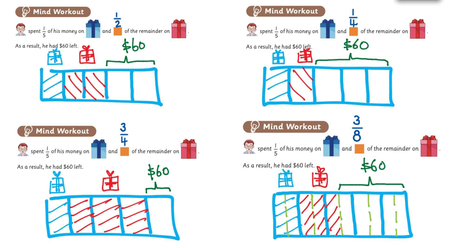|
The problem sums featured above are typical of our math curriculum.
Very often, our dyslexic children struggle to comprehend the questions. There are potential ‘minefields’ in these questions that could set off a chain of confusion for them. You see them re-reading the questions. Frowns start to form, fingers start tapping on the table, they start fidgeting and soon, they throw their hands in the air and exclaim that they do not know how to do the questions. Dyslexics tend to think primarily in pictures and images as opposed to words. When they encounter certain symbols (be it words or numerals), they get confused by those whose meaning they cannot picture. When they cannot begin to think with that word or concept (such as addition, multiplication, fraction, place value, etc) in picture, they do not know how to make sense of a sentence. In the case of these problem sums, a dyslexic may be confused by the words ‘of’, ‘on’, ‘and’, ‘remainder’ and even concepts of what ‘1/5’, ‘1/2’, ‘1/4’, ‘3/4’, ‘3/8’ mean. Because the child does not know the meaning, he does not know what he needs to do to begin to solve the questions. The first step to help the child is to acknowledge the child’s picture thinking style. The child needs to master not only the meaning of those high frequency words used in math by having a picture or image of what they mean but also be able to picture what the different fractions look like. Very often, a dyslexic child’s struggle with problem sums is not because he does not have the skill to do arithmetic, but because he does not understand what the question is asking of him in the first place, as he cannot think with some of the words or concepts that are in the questions.
0 Comments
 Not all math/numeracy difficulties are signs of dyscalculia. Especially in our Singapore curriculum, where understanding math is first about English comprehension, before we can apply our mathematics skill. We have all had our fair share of trying to figure out what a problem sum is getting at, haven’t we? Math has its unique set of symbols and words that can cause confusion and disorientation. Very often, resolving the dyslexia and dealing with the trigger words specific to mathematics, can help the child have the understanding required to handle math. Dyscalculia is a specific learning difficulty associated with math/numeracy. This means that a person with dyscalculia will struggle with concepts required to understand mathematics.
Math is about measuring change. It is a series of consequence, done in sequence and in a certain order. People who have an inherent sense of these concepts can easily learn and understand math. Here are some ideas for teaching math that appeal to a dyslexic’s visual thinking style. |
Categories
All
Christina TanChristina has a Diploma in Disability Studies and is a licensed Davis Facilitator. |
|
|
Professional services described as Davis™, including Davis™ Dyslexia Correction, Davis™ Symbol Mastery, Davis™ Orientation Counseling, Davis™ Attention Mastery, Davis™ Math Mastery, and Davis™ Reading Program for Young Learners may only be provided by persons who are trained and licensed as Davis Facilitators or Specialists by Davis Dyslexia Association International. |




 RSS Feed
RSS Feed

